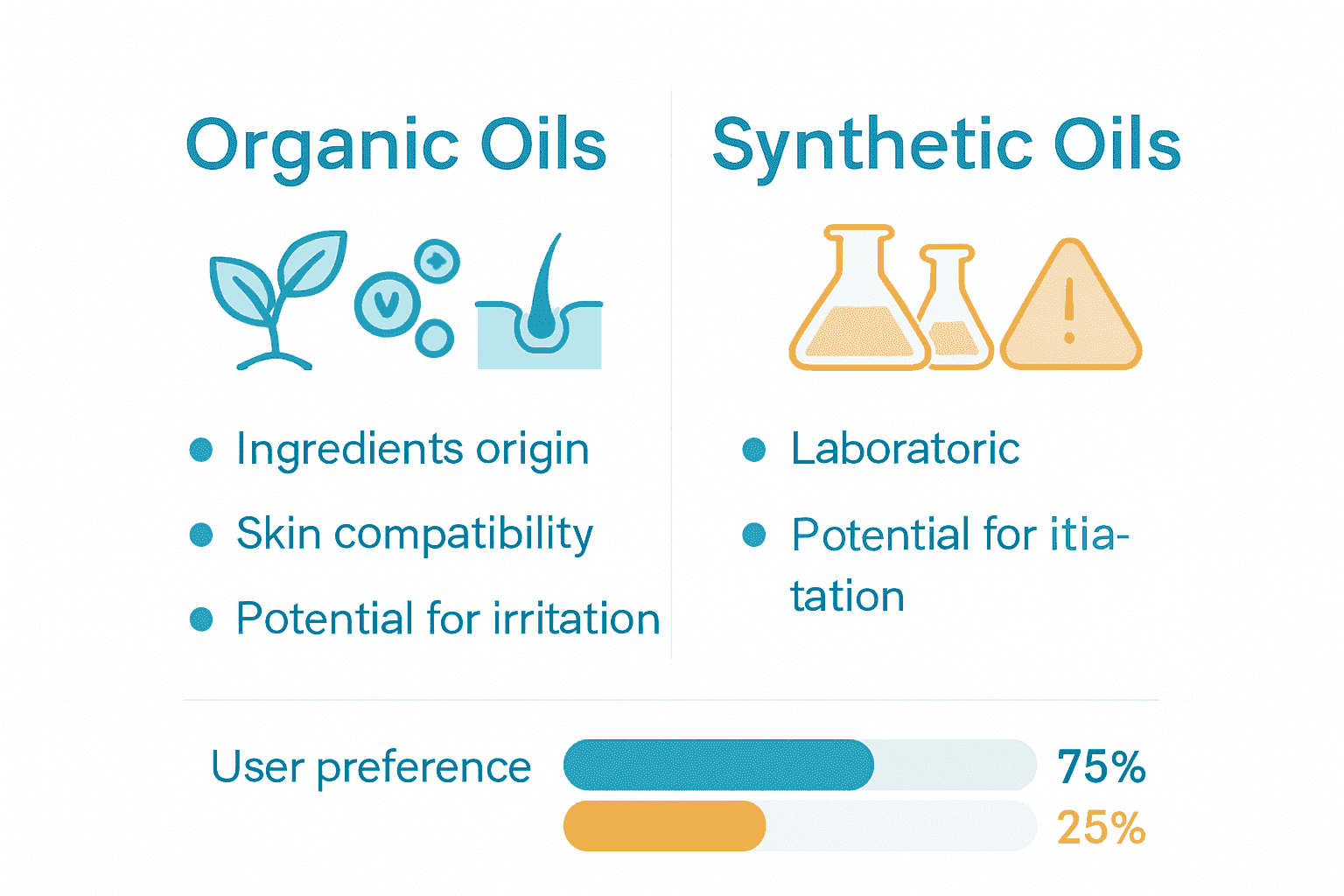Blog
Learning Materials
Complete Guide to Organic Hair Growth Oil
Updated: November 14, 2025

Over half of people searching for hair growth solutions are turning to natural oils instead of synthetic products. This shift matters because organic hair growth oils draw their strength from pure botanical ingredients shown to support scalp health and stimulate follicles without harsh chemicals. Whether you're struggling with thinning hair or aiming for a healthier routine, learning about these plant-based oils opens the door to safer, more effective hair care backed by both science and tradition.
Table of Contents
- Defining Organic Hair Growth Oil
- Main Types And Natural Ingredients
- How Organic Hair Growth Oils Work
- Safety, Allergies, And Quality Standards
- Comparing Organic And Synthetic Oils
- Common Mistakes And Optimizing Results
Key Takeaways
| Point | Details |
|---|---|
| Natural Ingredients | Organic hair growth oils utilize plant-based extracts that nourish hair and scalp, promoting long-term health without harsh chemicals. |
| Mechanism of Action | These oils stimulate hair follicles and improve blood circulation, addressing the root causes of hair loss and promoting growth. |
| Safety Considerations | Prioritize transparent ingredient lists and perform patch tests to ensure compatibility and minimize adverse reactions. |
| Avoid Common Mistakes | Proper application techniques and consistent use are vital for maximizing the effectiveness of hair growth oils. |
Defining Organic Hair Growth Oil
Organic hair growth oil represents a natural, nutrient-rich hair care solution derived entirely from plant-based sources. According to pharmajournal, these specialized oils are packed with essential vitamins, minerals, and fatty acids crucial for human cellular health, particularly for skin and hair regeneration.
These formulations differ significantly from synthetic alternatives by utilizing pure, unprocessed botanical ingredients. As research from ijraset indicates, herbal hair oils serve multiple purposes beyond basic conditioning, including:
- Promoting natural hair growth
- Addressing scalp dryness
- Supporting overall scalp health
- Repairing damaged hair strands
- Treating specific hair conditions like dandruff and split ends
The core philosophy behind organic hair growth oil centers on harnessing nature's most potent botanical extracts to nourish hair from root to tip. By focusing on pure, minimally processed ingredients, these oils provide a holistic approach to hair care that supports long-term hair health without introducing harsh synthetic chemicals. For more insights into using hair oils effectively, check out our tutorial on hair oil for natural growth.
Understanding the composition and benefits of organic hair growth oil empowers individuals to make informed decisions about their hair care routine. Whether you're combating hair loss, seeking to improve hair texture, or simply wanting to maintain healthy locks, these natural formulations offer a promising solution rooted in botanical science.
Main Types and Natural Ingredients
Organic hair growth oils encompass a diverse range of natural botanical extracts, each offering unique benefits for hair health and stimulation. Essential oils and carrier oils form the two primary categories of these nutrient-rich hair care solutions, working synergistically to promote optimal hair growth and scalp wellness.
Carrier oils like coconut, jojoba, and argan serve as foundational ingredients, providing deep moisturization and creating an ideal base for concentrated essential oils. Among the most potent essential oils, Glamour highlights rosemary oil as a standout ingredient. Research suggests this powerful extract can boost blood flow when massaged onto the scalp, potentially matching the effectiveness of minoxidil in stimulating hair growth.
Key natural ingredients commonly found in organic hair growth oils include:
- Coconut Oil: Rich in fatty acids and protein
- Jojoba Oil: Mimics natural scalp sebum
- Rosemary Oil: Stimulates blood circulation
- Argan Oil: Packed with vitamin E and antioxidants
- Castor Oil: Supports hair thickness and growth
For those interested in exploring more natural solutions, our guide on understanding herbs for hair growth offers comprehensive insights into botanical hair care strategies. Understanding these natural ingredients empowers individuals to select targeted, personalized hair growth solutions that align with their unique hair health needs.

How Organic Hair Growth Oils Work
Organic hair growth oils operate through a complex mechanism of nutrient delivery and scalp stimulation, targeting the root causes of hair health and growth. According to pharmajournal, the primary function of these oils is to increase hair growth by stimulating hair follicles and dramatically improving blood circulation to the scalp.
The scientific process involves multiple interconnected pathways of hair nutrition and cellular support. Ijraset research highlights that herbal hair oils provide a sophisticated blend of vitamins, essential oils, and terpenoids carefully formulated to promote healthy hair development. These specialized compounds work by:
- Delivering concentrated nutrients directly to hair follicles
- Reducing scalp inflammation
- Strengthening hair root structures
- Protecting against environmental damage
- Balancing natural scalp oil production
To maximize the effectiveness of organic hair growth oils, understanding proper application techniques is crucial. Gentle massage helps distribute nutrients, increases absorption, and stimulates blood flow, creating an optimal environment for hair regeneration. For those seeking deeper insights into essential oil strategies, our guide on understanding essential oils for hair offers comprehensive techniques and expert recommendations.
The intricate interactions between natural ingredients and scalp biology transform organic hair growth oils from simple cosmetic products into powerful hair restoration tools. By targeting the root causes of hair challenges and providing targeted nutritional support, these oils represent a holistic approach to achieving vibrant, healthy hair growth.
Safety, Allergies, and Quality Standards
Organic hair growth oils require rigorous safety assessments to ensure consumer protection and product efficacy. According to pharmajournal, comprehensive evaluations focus on multiple critical characteristics including texture, consistency, spreadability, and potential skin irritancy, with the goal of confirming minimal to no adverse side effects.
The scientific validation of these products extends beyond basic safety checks. Ijraset research highlights that quality organic hair oils must meet strict pH compatibility standards, ensuring they remain closely aligned with natural skin biochemistry. This meticulous approach helps prevent potential allergic reactions and skin sensitivities.
Key safety considerations for selecting high-quality organic hair growth oils include:
- Comprehensive ingredient transparency
- Third-party laboratory testing
- Hypoallergenic certifications
- Natural, non-synthetic ingredient profiles
- Patch testing recommendations
- Explicit allergen warnings
Before incorporating any new hair oil into your routine, conduct a patch test by applying a small amount to your inner forearm and waiting 24 hours to check for potential reactions. For individuals with sensitive skin or known allergies, consulting a dermatologist becomes an essential preliminary step. Those seeking additional guidance can explore our comprehensive guide on understanding organic oils for more in-depth safety insights.
Ultimately, the journey to finding the perfect organic hair growth oil is about balancing scientific rigor with personal compatibility. By prioritizing quality, transparency, and individual skin responses, users can confidently navigate the world of natural hair care solutions.
Comparing Organic and Synthetic Oils
Organic and synthetic hair growth oils represent two fundamentally different approaches to hair care, each with distinct characteristics and potential impacts on hair health. According to pharmajournal, herbal hair oils offer a superior alternative to chemical-based products, with ingredients that provide numerous benefits while meeting stringent quality parameters.
Ijraset research emphasizes that herbal formulations deliver a sophisticated blend of vitamins, essential oils, and terpenoids, creating a natural alternative that goes beyond the surface-level treatment of synthetic options. The key differences between organic and synthetic oils can be understood through several critical dimensions:
-
Ingredient Origin
- Organic: Derived from natural plant sources
- Synthetic: Manufactured using chemical compounds
-
Nutrient Composition
- Organic: Rich in natural vitamins and minerals
- Synthetic: Often contains artificial additives
-
Skin Compatibility
- Organic: Generally hypoallergenic and gentler
- Synthetic: Higher risk of skin irritation
For those looking to dive deeper into understanding hair care solutions, our guide to hair care oils provides comprehensive insights into selecting the most appropriate products for individual hair needs.
Ultimately, the choice between organic and synthetic oils goes beyond mere marketing.
It represents a holistic approach to hair health, where the source, purity, and natural potency of ingredients play a crucial role in achieving long-term hair growth and vitality.

Common Mistakes and Optimizing Results
Hair growth oil application requires precision and understanding to achieve optimal results. Many individuals unknowingly sabotage their hair growth efforts through common misconceptions and improper techniques that can actually hinder progress rather than promote healthy hair development.
One critical consideration involves proper essential oil dilution. According to Glamour, experts recommend diluting concentrated oils like rosemary with carrier oils such as jojoba or coconut to prevent potential scalp irritation. This approach ensures that potent essential oils deliver their benefits without causing unnecessary stress to the scalp.
Common mistakes that can compromise hair growth oil effectiveness include:
-
Incorrect Application
- Applying oils directly to dry hair
- Using excessive product quantity
- Neglecting scalp massage techniques
-
Inappropriate Oil Selection
- Choosing oils incompatible with hair type
- Ignoring individual scalp conditions
- Selecting low-quality or synthetic products
-
Inconsistent Usage
- Sporadic application
- Insufficient time for absorption
- Lack of consistent routine
To maximize results, develop a systematic approach that considers your unique hair characteristics and growth objectives. For personalized strategies tailored to individual hair needs, explore our guide to hair care oils, which offers comprehensive insights into optimizing your hair growth journey.
Successful hair growth oil implementation is about understanding nuance, respecting individual hair biology, and maintaining a patient, consistent approach. By avoiding common pitfalls and adopting a strategic methodology, you can transform your hair care routine into a powerful growth-enhancement strategy.
Unlock Your Best Hair Growth with Personalized Organic Solutions
Struggling to find the perfect organic hair growth oil that truly matches your unique scalp and hair needs can be frustrating. This guide highlights how factors like scalp sensitivity, ingredient quality, and correct application impact your hair health journey. If you want to take control of your hair growth with confidence, understanding these nuances is only the start.

Discover how AI-powered insights can transform your hair care routine. At MyHair.ai, we analyze your personal hair health using advanced technology to create tailored recommendations that honor the natural approach outlined in this article. From identifying the best oils for your hair type to guiding consistent care strategies, our platform helps you avoid common mistakes and accelerates your progress. Start your personalized hair growth journey today and experience the difference that a customized organic hair care plan can make. Visit MyHair.ai now to get your hair health assessment and explore expert-backed products designed just for you.
For expert guidance on essential oils and natural ingredients, check out our guide on understanding essential oils for hair. To deepen your knowledge about herbs and their benefits, see our guide on understanding herbs for hair growth. Take action now and give your hair the personalized care it deserves.
Frequently Asked Questions
What is organic hair growth oil?
Organic hair growth oil is a natural, nutrient-rich hair care solution derived from plant-based sources, designed to promote hair growth, address scalp health, and repair damaged hair.
What are the key ingredients found in organic hair growth oils?
Common ingredients include coconut oil, jojoba oil, rosemary oil, argan oil, and castor oil, each offering unique benefits for hair health and stimulation.
How do organic hair growth oils promote hair growth?
They work by stimulating hair follicles, improving blood circulation to the scalp, and delivering essential nutrients directly to hair roots, supporting overall hair health and growth.
What are common mistakes to avoid when using hair growth oil?
Common mistakes include applying oils directly to dry hair, using excessive product, neglecting scalp massage, and having an inconsistent application routine.
Recommended
- Understanding Organic Oil 2025: A Comprehensive Guide | MyHair
- Best Hair Oil for Hair Growth Homemade: Recipes & Results 2025 | MyHair
- How to Use Hair Oil for Natural Hair Growth and Strength | MyHair
- Fast Hair Growth Oil: Top Picks and Proven Tips for 2025 | MyHair
- Role of Natural Oils for Lips: Complete Guide – Luméra Cosmetica
- What Is Holistic Haircare? Complete Essential Overview